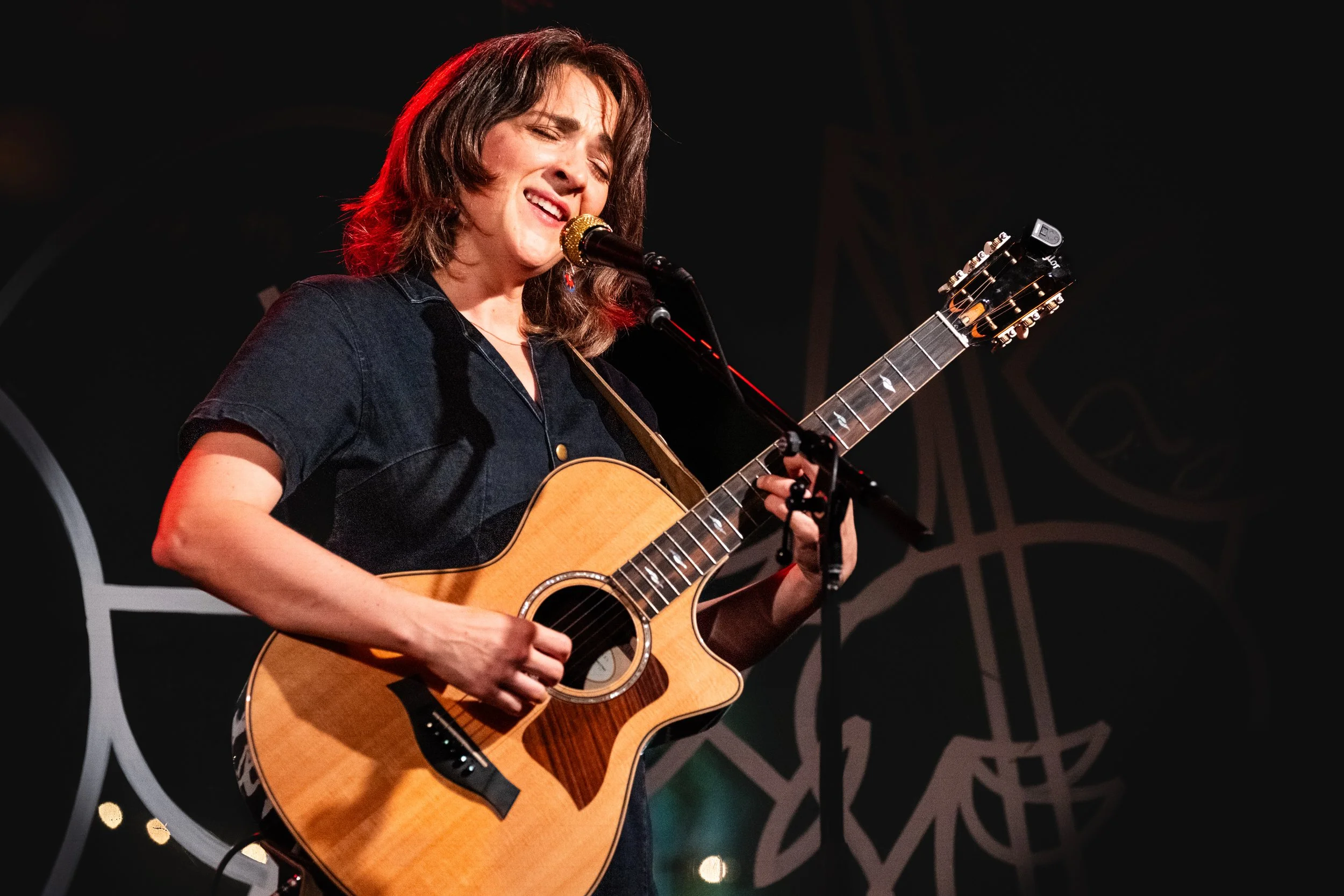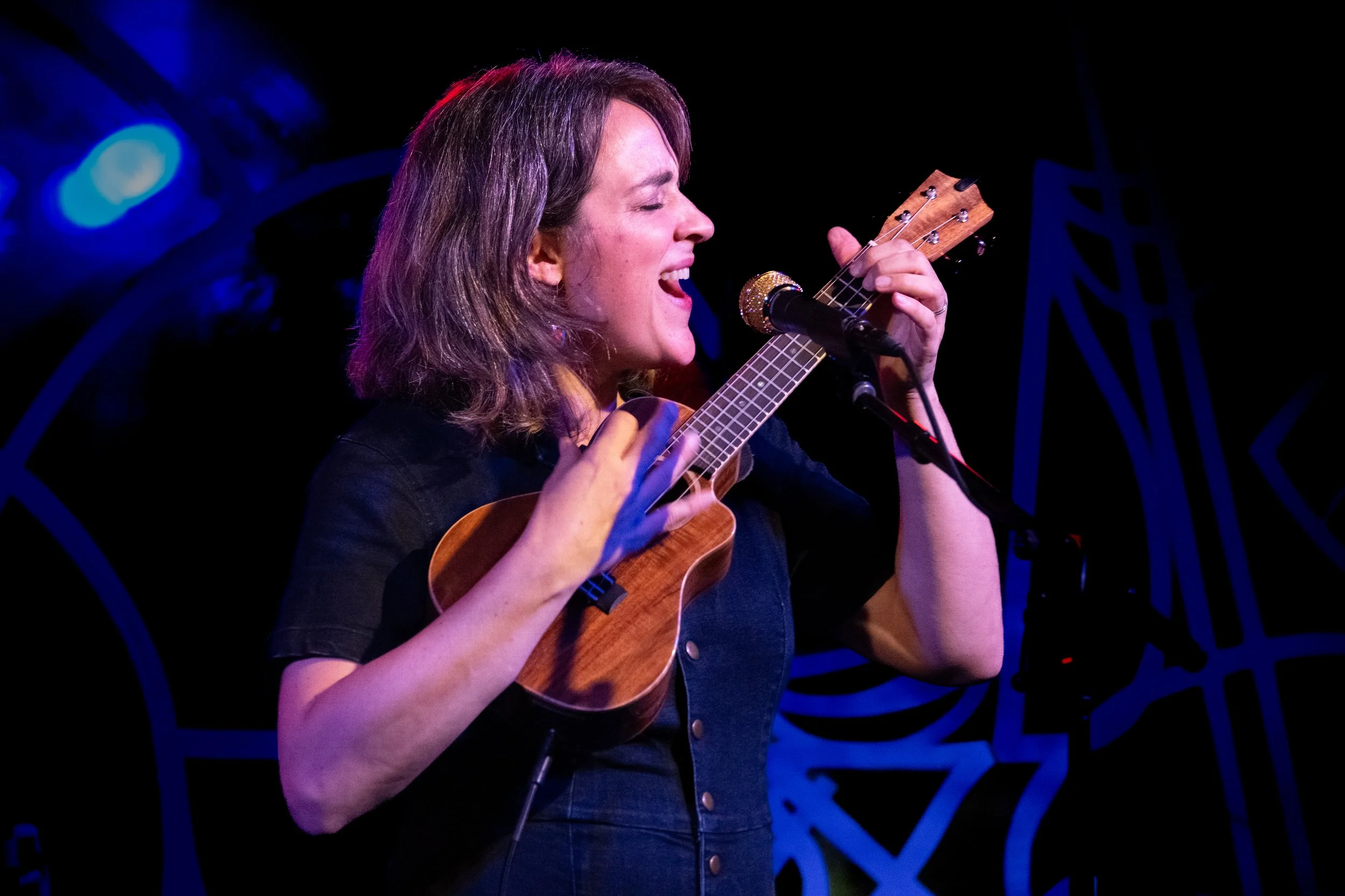Becca Stevens: Stories That Carry the Journey
Becca Stevens. Photo: Steven Roby
Drawing on Maple to Paper and earlier work, Becca Stevens framed private milestones as waypoints on a craft-first musical journey.
What happens when a songwriter transforms an intimate space into a map and invites us to follow her route? That was the guiding question of Becca Stevens’ early set at the Joe Henderson Lab, where voice and guitar became coordinates, and each song represented a mile of lived experience. The premise was straightforward: Maple to Paper, her 2024 voice-and-guitar cycle, performed without a safety net. What made the night engaging was how precision and honesty went hand in hand—open tunings that revealed unexpected colors, lyrics that conveyed grief and determination equally, and stage talk that clarified her process without smoothing out emotion.
She started with “Now Feels Bigger Than the Past,” a small thesis. The song examines why art is most embraced after loss, and during its performance, it becomes a reflection on memory: how the mind reshapes time when a parent is failing and a child is arriving. Stevens placed the writing within that pressure—one daughter’s birth before her mother’s passing, another right after the album finished. Her singing was steady and clear, with consonants softly close to the mic and vibrato controlled to serve meaning. The mood was personal, but the craftsmanship kept emotion from overflowing.
“Should Have Been There for Me” followed with calm ferocity. A clipped guitar figure set a steady pulse while the melody floated above it, syllables landing like deliberate steps. Stevens introduced “Wild Eyes Open” with the most personal framing of the night, crediting her mother for phrases that surfaced in the final stretch: a trapped mouse released across a river to “find his family,” a grandmother holding a newborn and asking, “Are you a little piece of God that came down for me to hold?” It read as field notes from a household in transition. Harmonically, her open tunings let bass notes bloom beneath glassy treble shapes, so the voice sat free of obvious triads. The effect was breathing space—room enough for images to ring.
Becca Stevens. Photo: Steven Roby
When the set shifted to “I’m Not Her,” Stevens directed humor toward purpose. She described a writing exercise: give in to the doomscroll, then build a bridge back to work. The lyric illustrated self-reflection and forgiveness, but the main message was resolve, not dismissal. Guitar and voice locked into a percussive spring, creating a groove that invites a listener to lean forward without feeling pressured. Stevens’ harmonic language has long favored suspended tones and ringing drones, but it never felt like a display of theory; it felt like the simplest way to keep the lyric at the core.
Older material framed the journey more broadly. “Regina,” the title track of her 2017 album, revisits the sovereign alter-ego she calls on when identity feels fragile. She floated the melody over a lattice of open shapes that suggested motion without forcing it, and the room fell into a collective hush. Later, “Tillery” served as a seasonal hymn, its lyrics delivered with storyteller patience. Both moments emphasized a common thread in Stevens’ writing: she makes two hands and six strings feel whole, yet the arrangements hint at the chamber instincts that have made her a sought-after collaborator.
A brief tribute deepened the portrait. Stevens mentioned David Crosby’s encouragement during the making of Maple to Paper and reminisced about years in his Lighthouse Band. Then came a quick nod to Joni Mitchell with “Help Me.” Mid-song, a ukulele strap slipped. She drew the instrument closer, joked, “Now we’re in Hawaii,” and kept the line intact. The moment felt like a small evening: focus over show, music carrying the feeling rather than the other way around.
Becca Stevens. Photo: Steven Roby
As a guitarist, Stevens uses open tunings to introduce new harmonic colors and craft counter-lines that keep the voice flexible. As a singer, she relies on articulation and breath control. That balance—combining an engineer’s curiosity with a poet’s ear—shapes a career that fluidly moves across different scenes, from Crosby to Attacca Quartet to film soundtrack work. On Maple to Paper, she recorded and engineered at home, capturing live performances without overdubs; in the Lab, that same close-at-hand approach persisted. The songs felt handcrafted and sturdy, designed to travel.
The set ended with “Rainbow Connection,” dedicated to her children, including a “rainbow baby.” Stevens sang it simply; the melody was driven by a light, natural momentum. The choice emphasized the night’s message. She wasn’t offering nostalgia; she was using a familiar melody to reach outward, from personal story to shared hope. After the final chord, she blew kisses, bowed, and headed to the merch table to briefly meet listeners before the late set—a practical, human ending to a thoughtfully crafted hour.
Becca Stevens. Photo: Steven Roby
What lingered was the intelligence of her framing. Stevens doesn’t treat autobiography as content; she treats it as material. Private milestones become common language because they’re shaped with attention—images grounded, harmonies purposeful, forms matched to the pressure of each line. Genre becomes a set of tools rather than a border. Folk detail, jazz time, chamber color: each serves the song’s meaning. That stance places her in the modern lineage of songwriter-improvisers who keep discovery at the center.
Conclusion: The performance argued that intimacy is something you build. With one voice and one guitar, Stevens offered a record of passage—mourning and mischief, rigor and warmth—rendered with a focus that invited trust. That is where her journey points: toward songs designed to breathe in any setting and toward collaborations that treat fluency, not crossover, as the goal. As she carries Maple to Paper forward and returns to ensemble projects, the road looks open. The stories will keep traveling because they’re built for it, and Stevens—restless, precise, generous—stands squarely inside a living tradition that moves by telling.
Program Notes
Venue: Joe Henderson Lab, SFJAZZ Center, San Francisco
Date: October 15, 2026
Showtime: 7:00 p.m.
Setlist: “Now Feels Bigger Than the Past,” “Should Have Been There for Me,” “Wild Eyes Open,” “I'm Not Her,” “Regina,” “Someone Else Again,” “Help Me,” "Tillery," and “Rainbow Connection.”




